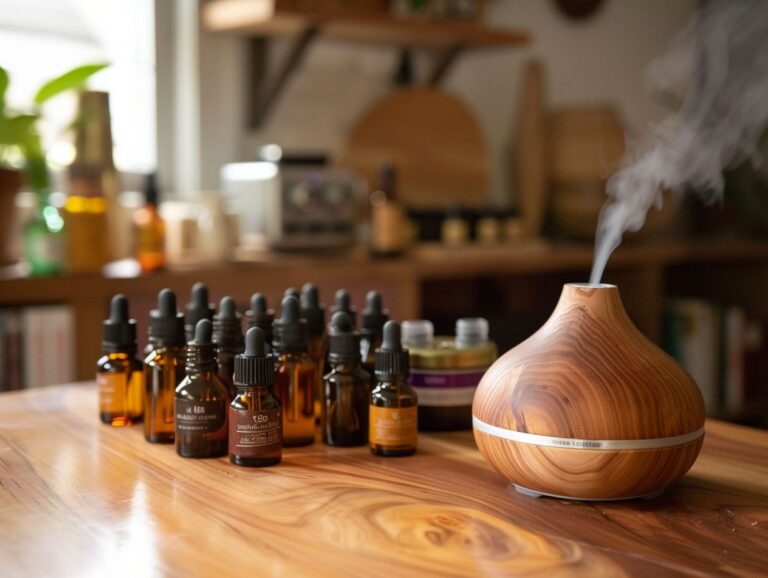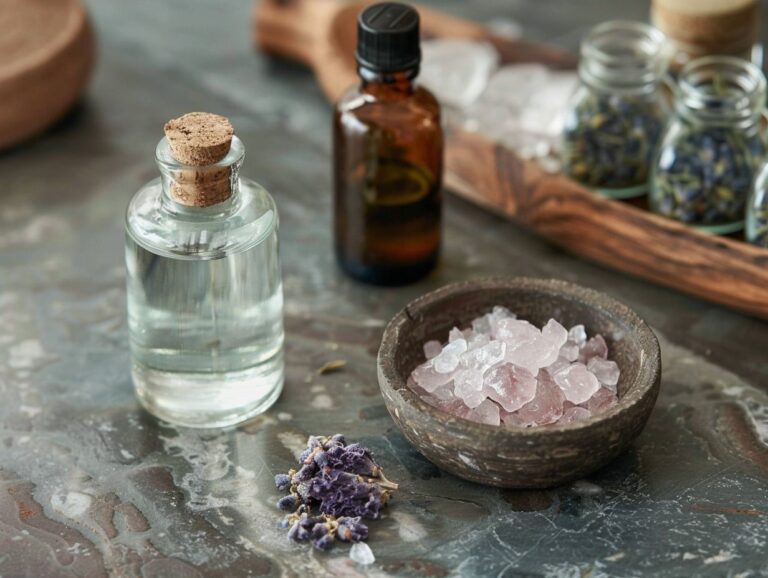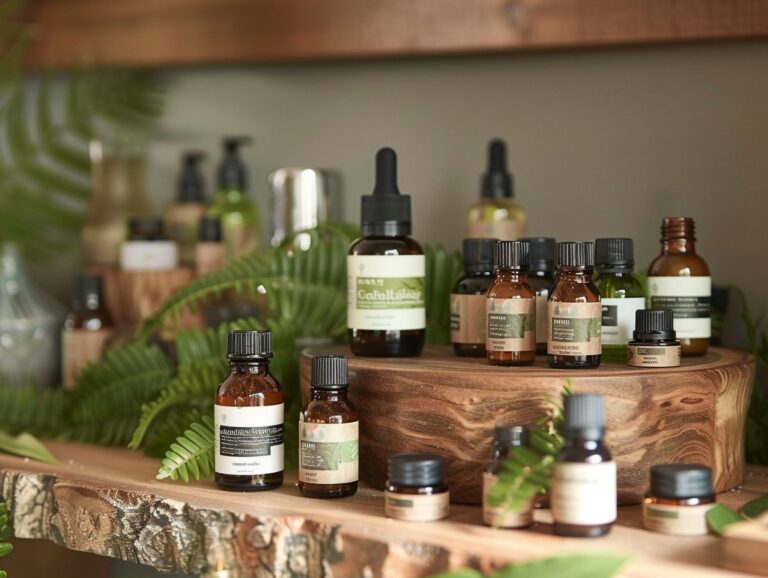What Essential Oils Taste Good
Essential oils have become a popular choice for natural remedies and aromatherapy.
Learn about the various ways essential oils can be used, including is essential oils good, aromatherapy, topical application, and ingestion.
Discover safety concerns, proper dilution, and dosage when ingesting essential oils, along with some essential oils that taste good and their potential benefits in cooking.
Let’s dive in!
Key Takeaways:
What Are Essential Oils?
Essential oils are concentrated hydrophobic liquids containing volatile aroma compounds from plants. They are often extracted through distillation or mechanical methods and are highly aromatic.
Historically, essential oils have been used for centuries in various cultures for their therapeutic properties and aromatic benefits. The extraction process involves steaming or pressing plant material to release the potent oils. Lavender oil is one of the most popular essential oils known for its calming effects and skin-healing properties. Peppermint oil is another favorite thanks to its invigorating scent and potential to alleviate headaches. From diffusing oils for relaxation to using them in skincare routines, essential oils play a versatile role in enhancing overall well-being.
How Are Essential Oils Used?
Essential oils are commonly used in three main ways: aromatherapy through diffusers for inhalation, topical application on the skin, and as natural fragrance additives in various products.
One of the most well-known applications of essential oils is in aromatherapy, which involves the therapeutic use of aromatic plant extracts to promote physical and emotional well-being. For example, lavender oil is often used to induce relaxation and improve sleep quality, while peppermint oil is known for its invigorating and energizing properties. In terms of skincare, essential oils like tea tree oil and rosehip oil are popular for their antibacterial and anti-inflammatory properties, making them effective remedies for acne and skin irritation.
Aromatherapy
Aromatherapy involves the use of essential oils in a diffuser to create a pleasant and therapeutic atmosphere. Oils like Lavender, Eucalyptus, and Jasmine are commonly used for relaxation and stress relief.
Specifically, Lavender oil is renowned for its calming properties, helping to alleviate anxiety and promote a sense of tranquility. On the other hand, Eucalyptus oil is excellent for clearing the mind and easing respiratory issues, making it a popular choice during cold and flu seasons.
The sweet floral scent of Jasmine oil is associated with mood enhancement and has uplifting effects, ideal for combatting feelings of depression or fatigue.
Topical Application
Topical application of essential oils involves diluting them with a carrier oil and applying them to the skin. Oils like Peppermint, Tea Tree, and Spearmint are popular for their skin-soothing properties.
Peppermint oil is known for its cooling effect, making it great for alleviating headaches and muscle tension when applied topically.
Tea Tree oil is renowned for its antimicrobial and anti-inflammatory properties, making it useful in treating acne and minor skin irritations.
Spearmint oil is gentle on the skin and can help soothe itching and inflammation, especially for those with sensitive skin.
When applying these oils topically, it is crucial to dilute them properly to prevent skin irritation or reactions. Utilizing a 2-3% dilution ratio is generally recommended for safe topical application.
Ingestion
Ingesting essential oils involves adding them to food or beverages for internal consumption. Citrus oils like Grapefruit, Orange, and Lemon are popular choices for their refreshing flavors.
While the culinary use of essential oils can enhance the taste of dishes, it is crucial to note that not all essential oils are safe for ingestion. Some oils can be toxic if ingested in large quantities or if not properly diluted. It’s recommended to consult a healthcare professional before incorporating essential oils into your diet, especially if you have any medical conditions or are pregnant.
When using oils like Grapefruit, Orange, and Lemon in cooking, it’s essential to follow proper dosage guidelines to avoid any adverse effects. These oils can add a burst of flavor to salad dressings, marinades, or cocktails, but moderation is key to enjoying their benefits safely.
Can Essential Oils Be Ingested?
The ingestion of essential oils is a debated practice due to safety concerns and the need for proper dilution and dosage guidance. Before ingesting any essential oil, it is crucial to seek advice from a qualified healthcare provider.
Regarding the risks associated with ingesting essential oils, one major concern is their potency. Essential oils are highly concentrated extracts derived from plants, and when ingested in undiluted form, they can cause irritation, damage to internal organs, and even toxicity.
On the other hand, there are potential benefits to ingesting essential oils, such as supporting digestive health, boosting immunity, and providing relief from various ailments. These benefits should always be weighed against the associated risks.
Caution is key when considering internal use of essential oils. It is advisable to dilute them properly using carrier oils or other appropriate mediums to minimize the risks. Consulting with a trained aromatherapist or healthcare professional can help determine safe dosage levels for individual needs.
Safety Concerns

Safety concerns regarding ingesting essential oils revolve around the potency and concentration of oils like Oregano, Clove, and Wintergreen. These oils can be highly irritating or toxic if not used properly.
When ingested inappropriately, these oils may cause issues ranging from mild digestive discomfort to severe reactions that could require medical attention.
Oregano oil, for instance, is known for its antimicrobial properties, but when consumed in excessive amounts, it can upset the stomach and even lead to burning sensations.
Similarly, Clove oil, often used topically for its numbing effect, can be harmful if ingested in large quantities, potentially causing liver damage or respiratory distress.
Wintergreen oil, prized for its cooling sensation, contains a high concentration of methyl salicylate, which can be toxic if consumed excessively.
It is crucial to dilute these potent oils properly before ingestion and always seek guidance from a qualified aromatherapist or healthcare professional. Safe practices include starting with minimal amounts, observing for any adverse reactions, and avoiding prolonged internal use without professional supervision.
Proper Dilution and Dosage
Proper dilution and dosage of essential oils are crucial to prevent adverse reactions. Oils like Ginger, Thyme, and Anise require careful dilution to ensure safe ingestion without causing harm.
Regarding essential oils, it’s important to understand that they are highly concentrated plant extracts, which means they can be potent and powerful when used improperly. Ginger, known for its digestive benefits, Thyme for its antibacterial properties, and Anise for its soothing effects, all offer a range of health benefits. These oils should never be ingested neat or undiluted, as this can lead to skin irritation, digestive issues, or even toxicity.
To dilute essential oils for ingestion, a common method is to mix a few drops with a carrier oil such as coconut, almond, or olive oil. This helps to mitigate any potential skin sensitivities and ensures that the oils are spread out effectively in the body. The recommended dilution ratio can vary depending on the oil and individual tolerance, so it’s essential to consult a qualified aromatherapist or healthcare professional to determine the best approach.
What Essential Oils Taste Good?
Some essential oils that taste good include Citrus Oils like Orange and Grapefruit, Mint Oils such as Peppermint, Spice Oils like Clove, and Floral Oils such as Jasmine. These oils add unique flavors to food and beverages.
Citrus essential oils like Orange and Grapefruit provide a burst of tangy freshness, perfect for adding zing to salads, marinades, and cocktails.
Mint oils such as Peppermint offer a cool, refreshing flavor that pairs well with essential oils combo desserts and fruity beverages.
Spice oils like Clove bring warm, earthy notes to savory dishes like curries and stews, while
Floral oils such as Jasmine lend a delicate, floral aroma to desserts and teas.
Citrus Oils
Citrus essential oils like Grapefruit, Orange, and Lemon are popular for their tangy and refreshing flavors, which can elevate the taste of beverages and culinary creations.
The bright and zesty notes of these oils are perfect for infusing salads, marinades, dressings, and desserts with a burst of citrusy goodness. Grapefruit oil adds a slightly bitter and sweet touch, Orange oil brings a sunny and sweet flavor, while Lemon oil contributes a sharp and tart essence. Check out which essential oils smell good for culinary creations.
In mixology, these oils can be used to craft refreshing cocktails like citrus-infused margaritas, lemon meringue martinis, or orange blossom spritzers. Their intense flavors provide a concentrated burst of citrus, making them versatile ingredients in both sweet and savory dishes.
Mint Oils
Mint essential oils like Peppermint and Spearmint offer a cooling and invigorating taste that works well in desserts, beverages, and savory dishes. These oils provide a fresh and uplifting flavor profile.
Peppermint oil can add a burst of freshness to chocolate desserts, while Spearmint oil complements fruity cocktails with its subtle minty note. Incorporating these oils into salad dressings can elevate simple greens to gourmet status, enhancing the overall taste profile. A mint-infused simple syrup can transform basic recipes into culinary delights, from drizzling over fresh fruit to creating a minty glaze for meats or veggies. The versatility of mint essential oils in cooking highlights their significance in both sweet and savory creations.
Spice Oils
Spice essential oils like Clove, Ginger, and Oregano add warmth and depth to dishes, making them ideal for savory recipes, baking, and infused beverages. These oils bring rich and aromatic notes to culinary creations.
Regarding using essential oils in cooking, a little goes a long way.
- Clove oil can elevate the taste of stews and soups with its intense, slightly sweet flavor.
- Ginger oil brings a pungent kick to stir-fries and marinades.
- Oregano oil, with its earthy and herbaceous profile, pairs perfectly with tomato-based sauces and salad dressings.
Adding a drop or two of these oils can transform a simple dish into a culinary masterpiece.
- For example, a drizzle of Clove oil in a mulled wine recipe enhances the warm and spiced notes.
- Ginger oil in a pumpkin pie filling adds a zesty twist.
- Oregano oil mixed with olive oil makes a flavorful marinade for grilled vegetables or meats.
Floral Oils
Floral essential oils like Lavender, Jasmine, and Rosemary offer delicate and aromatic notes that elevate desserts, teas, and floral-infused dishes. These oils bring a touch of elegance and sophistication to culinary creations.
Regarding Lavender, its floral scent lends a subtle sweetness, perfect for pairing with creamy desserts or infusing into syrups for cocktails. Jasmine, on the other hand, brings a romantic floral essence, ideal for enhancing the flavor of rice dishes or incorporating into delicate pastries.
Meanwhile, Rosemary offers a robust and earthy aroma, making it a versatile addition to savory recipes like roasted meats, vegetables, and even bread. These essential oils not only enhance the taste but also add a visual appeal with their vibrant colors when used judiciously in cooking and baking.
How Can Essential Oils Be Used In Cooking?

Essential oils can be used in cooking both for flavoring dishes and for their potential medicinal properties. When used judiciously, essential oils add unique and concentrated flavors to culinary creations.
When incorporating essential oils into cooking, it’s important to choose high-quality, food-grade oils like peppermint or lemon for optimal flavor. A drop of lavender oil can elevate a simple dessert like lemon bars, giving them a fragrant twist. In savory dishes, a touch of oregano or thyme oil can transform a basic tomato sauce into a gourmet delight. Be cautious with quantities as essential oils are potent; always start with a small amount and adjust to taste.
Flavoring
Essential oils like Bergamot, Spearmint, and Wintergreen are versatile flavoring agents that can be used in both sweet and savory dishes. These oils infuse dishes with intense and aromatic tastes.
Regarding culinary applications,
- Bergamot essential oil adds a citrusy and floral note, perfect for enhancing desserts like lemon tarts or adding a unique twist to seafood dishes.
- Spearmint essential oil, on the other hand, brings a refreshing and minty flavor profile that pairs exceptionally well with lamb dishes, salads, or even homemade ice cream.
- Wintergreen essential oil lends a minty and slightly woody undertone, ideal for elevating chocolate-based recipes such as brownies and truffles.
Medicinal Purposes
Certain essential oils like Rosemary, Oregano, and Thyme are valued for their potential health benefits and medicinal properties. These oils can be used in cooking to support wellness and add herbal notes to dishes.
Among these essential oils:
- Rosemary is known for its antioxidant properties and ability to improve digestion. It is believed to enhance memory and concentration, making it a popular choice for studying or work environments.
- Oregano, on the other hand, is praised for its antibacterial and antifungal effects, which can help boost the immune system and fight off infections.
- Thyme essential oil is commonly used for respiratory health due to its expectorant and antiseptic qualities.
When incorporating these oils into your cooking, it is crucial to use them judiciously. Due to their potency, a little goes a long way, and excessive consumption can lead to adverse effects. It is recommended to start with small amounts and gradually increase based on your taste preferences and desired health benefits. Whether adding a drop to marinades, salad dressings, or soups, these essential oils can not only elevate the flavor profile of your dishes but also contribute to your overall well-being.
What Are The Benefits Of Ingesting Essential Oils?
Ingesting essential oils can offer various benefits such as improved digestion, boosted immunity, and enhanced mental clarity. It is essential to use them cautiously and prudently under expert guidance.
Essential oils are extracted from plants and carry potent natural properties that can positively impact the body’s functions.
Studies have shown that certain oils like peppermint can aid in relieving indigestion and soothing an upset stomach, while others like oregano possess antimicrobial properties that can strengthen the immune system.
The inhalation of oils like rosemary or lavender has been linked to improved cognitive performance and reduced stress levels.
By incorporating these oils into your routine, you may experience enhanced overall wellness.
Improved Digestion
Essential oils like Ginger, Anise, and Peppermint are known for their digestive benefits when ingested. These oils can aid in easing indigestion, bloating, and stomach discomfort.
One of the primary mechanisms of action of these essential oils is their ability to stimulate digestive enzymes, promoting better breakdown and absorption of nutrients. For example, Ginger essential oil can help reduce nausea and improve overall digestion. Anise essential oil is known for its carminative properties, which can alleviate gas and bloating. Similarly, Peppermint essential oil has a soothing effect on the digestive system, reducing cramps and discomfort.
Boosted Immunity
Essential oils like Eucalyptus, Rosemary, and Tea Tree are revered for their immune-boosting properties when ingested. These oils can support the body’s defenses and promote overall well-being.
When these essential oils are consumed, they release potent compounds that play a crucial role in enhancing the immune system. Eucalyptus oil, known for its anti-inflammatory and antimicrobial properties, contains cineole, a compound that helps clear respiratory congestion and fight off infections.
- Rosemary oil, on the other hand, is rich in antioxidants like rosmarinic acid, which combat oxidative stress and bolster immunity
- Tea Tree oil’s main component, terpinen-4-ol, exhibits powerful antimicrobial actions that can help fend off pathogens when ingested in controlled amounts.
To safely ingest these oils, it is essential to dilute them properly in a carrier oil or water. A recommended dosage is a few drops mixed in a beverage or added to recipes. Always consult a healthcare practitioner before internal use to ensure safety and efficacy.
Enhanced Mental Clarity
Essential oils like Bergamot, Spearmint, and Clove are recognized for their ability to enhance mental clarity and focus when ingested. These oils can promote cognitive function and uplift the mind.
When these essential oils are consumed, Bergamot is known for its mood-boosting properties, Spearmint for its refreshing scent that invigorates the senses, and Clove for its stimulating effects on mental alertness.
Bergamot, with its citrusy and floral notes, is believed to reduce feelings of stress and anxiety, thus improving concentration. Spearmint, on the other hand, is revered for its ability to clear the mind and aid memory retention.
Clove essential oil is often used for its reputed capacity to enhance focus and maintain mental sharpness, making it a popular choice for those seeking to increase productivity and mental acuity.
Frequently Asked Questions
What Essential Oils Taste Good?
Answer: Essential oils are highly concentrated plant extracts that are typically used for aromatherapy. However, some essential oils can also be ingested and have a pleasant taste. Here are 6 essential oils that taste good and can be safely ingested.
1. Which essential oils have a sweet taste?
Answer: Some essential oils with a sweet taste include peppermint, lemon, grapefruit, and orange. These oils can be added to food or beverages to give them a delicious and refreshing flavor.
2. Can I use essential oils in cooking?
Answer: Yes, certain essential oils can be used in cooking. However, it is important to use food-grade essential oils and to follow recipes and recommended amounts carefully. Some popular oils for cooking include basil, rosemary, and cinnamon.
3. What essential oils taste good in tea?
Answer: Chamomile and lavender essential oils are great options for adding a floral and soothing flavor to tea. Peppermint and ginger essential oils also add a refreshing and spicy taste to tea.
4. Are there any essential oils with a savory taste?
Answer: Yes, some essential oils have a savory taste and can be used in cooking or as a seasoning. These include thyme, oregano, and basil. Just remember to use them in moderation as they are highly concentrated.
5. Can essential oils be used to make flavored water?
Answer: Absolutely! Essential oils like lemon, lime, and grapefruit are perfect for adding a burst of flavor to plain water. Just make sure to dilute the oil in water before drinking, as they can be quite potent.
6. What are some other ways to use essential oils for their taste?
Answer: You can add a drop or two of essential oils to your smoothies, salad dressings, or even cocktails for a unique and delicious taste. Just make sure to use oils that are safe for ingestion and do not exceed the recommended amount.









One Comment